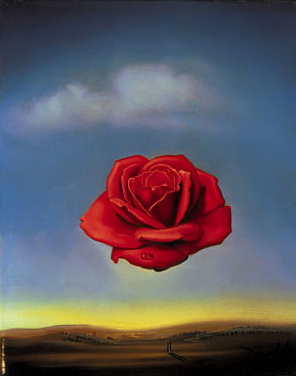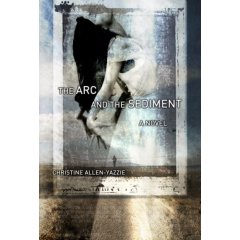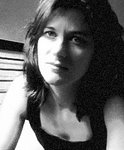
| Fiction | Essays | Poetry | The Ten | On Baseball | Chapbooks | In Memory |
|
writers on the creative life featuring Christine Allen-Yazzie
1. When did you start writing? Somehow I feel like I should say I’ve been writing since I was a kid. I read a lot, but I didn’t write till college. I’d forced myself onto my family’s mens' camping trip in the desert through about three years of pouting and spite and confrontation. When my dad finally allowed me to go, the men, needless to say, weren’t happy with me. There was a newcomer to the group—Brent. Not only was he not angry with me, he encouraged me to think, express, enjoy. I think he felt sorry for me. He told stories, and he was charismatic and compassionate with young people. And when he saw I was horrified of snakes, he caught one to put on my back, across my arms, and my phobia evaporated. He died less than two weeks later, trying to save his daughter whom he’d taken scuba diving. I guess I started writing so I could write something to honor him. Then I wrote poetry—really horrible little poems. I was having a sexual-identity crisis on many levels, and I had questions. I had demands. I thought maybe the poems would render answers, resolutions (they didn’t). Also, I was a compulsive studier, and stopping every hour or three to work on a poem made it possible to continue through the night. If the Internet in the nineties was the phenomenon it is now, I doubt it would have happened. I’d have surfed the Web till my eyes turned blue. 2. What is your writing routine like? I spend most of my life trying to find a routine—any routine—for anything. I don’t even fill out my check fields in the same order from one check to the next. I can tell you what I can’t do to write. I can’t write when I’ve been drinking (I’ll fall asleep). I can’t write in bed (I’ll fall asleep). I can’t write in the morning (I’d rather sleep). I seem most productive if I leave the house to write, because I’m always listening for my kids, even if someone’s watching them. I can tune out strangers, though—coffee drinkers, pool players, librarians—and I’m less likely to fall asleep in public places. If I’m broke (no money for coffee), I stay up until everyone’s gone to sleep, then write till early morning. I wouldn’t recommend my approach to writing to anyone. 3. Who are some of your favorite writers, and which writers have had the strongest influence on you? I don’t think I can make a top-something list, because I’m grateful to so many writers—if I leave someone out I’ll obsess about it for days, feel guilty as if they cared (or, in some cases, were alive). Let me start with techniques that impressed me and examples of them. I love the idea of a text that undermines its own authority as a sort of protest against heavy-handed symbolism and didactic rhetoric. This I learned from François Camoin (Like Love, but Not Exactly) and Alain Robbe-Grillet (For a New Novel)—from both their fiction and narrative theory. I like a disjunctive text that loops or skips back on itself and off-track, causing the reader to question truth, linearity, causality, that kind of stuff. Three books that come to mind are Robert Coover’s Briar Rose, Lorrie Moore’s Self-Help, and Joyce Carol Oates’s Black Water. (I read Black Water without knowing it was about Ted Kennedy, so I suppose now I might read it again and see less craft and more political positioning.) These kinds of narratives resonate with me because I feel I’m always going back to the same experience, different cloak. Last, I’m crazy about a narrative that shows great compassion and insight about a given population, yet resists the urge to teach the reader a lesson or stereotype the people right out of humanity. Helena María Viramontes’s Under the Feet of Jesus, for example; I can’t wait to read her upcoming novel, Their Dogs Came with Them. Sherman Alexie—I thought Lone Ranger was intense this way, but I just finished Toughest Indian in the World. Nice! I also loved John Steinbeck’s Tortilla Flats, though I can see Steinbeck was less successful at resisting the familiar than either Viramontes or Alexie. Also, I understand some would accuse Steinbeck of racism or derision toward his characters, but a basic cynicism is what I see, and it’s possible to be compassionate and perceptive and, at the same time, cynical, isn’t Right now I’m trying to learn something about character development from Zadie Smith and Salman Rushdie. Oh, and Sandra Cisneros’s seductive, lyrical, confrontational style first made me want to write—want it so bad, my teeth ached—not just to honor someone, but to craft something good. 4. Besides writing, what are you most passionate about in your life? My kids—that goes without saying. Politics inflame me like nothing else. But I’ll let that lie. Meeting strangers (prodding them for reckless stories) excites me like nothing else. That too should lie. My extended family. Wilderness, especially involving desert redrock or piney mountains and, of course, fire pits and family. Books—wishing I read more often. My darkroom—wishing I could spend more time in it. My horse—wishing I rode her more often. My guitar—wishing I knew how to play it. Skiing—wishing I went more often (i.e., wishing I had the money to go more often). My fabric—wishing I made more costumes. Film—wishing I used my camera for art, not information. Certain languages—none of which I speak. I’m told I’m a passionate woman. I don’t get it. Mostly I just watch the world and wish. 5. What kind of music do you enjoy, and do you find that music has an influence on your writing? I love my husband’s music. He’s a singer with Cathedral Lakes, a northern-style, Navajo-based drum group. I’m a big White Fish Jrs. fan, which is why they show up in my book. Eagle Creek is giving them a run these days, though—very sharp, very nice. I love most anything roots-n-blues. And of course, indie pissy-chick music. But I rarely write while listening to music. I can’t, because I’d rather hear the music than my narrative, and I’ll just stop writing and start making cookie dough or something. Writing isn’t something I consider pleasant; listening to music is. I think the musicians that influence me most are Sinead O’Connor, Dresden Dolls, Kirstin Hersh, Eleni Mandell, Lauryn Hill, Laurie Anderson, Ani DiFranco, Emily Wells (there are so many). These women have real courage. I’ll bet they’re not shaking in their boots over how many people they’re bound to offend (in my case, with my novel at least, that’s a lot of people). I listen to these women and remember who I was when I too had bravery; they make me want to go back to that. And actually, with this novel, I think I came close. Closer than I thought I could. 6. Where are your favorite places to travel? Down a river, accompanied by people who know what they’re doing and don’t mind that I don’t. Also, I loved Tokyo, NYC, San Francisco—I always appreciate a vertical city. The ocean is definitely attractive as a concept. Can I just say anywhere that’s not overly flat? And in absence of buildings, there must be trees. Availability of coffee is a plus. 7. Where do your best ideas come from, or, what creates your most inspired state? Reading groundbreaking fiction or revisiting the French deconstructionists. Film. Long, compulsory drives. Also, I have to start with something difficult, something I haven’t yet been able to talk about, that I couldn’t possibly talk about out loud (yet). This is a problem, since I prefer to write comically rather than tragically. I love dark humor, but I worry I’ve exhausted my spectrum of dark in Arc, and I can’t keep writing the same novel. Outside of reading-writing, I’m most inspired by anything involving water, getting out of town, the visual arts, activism, volunteerism. I used to volunteer for something or other whenever I was overwhelmed by chemical depression and bad luck. Which was often. I miss that—volunteerism, that is. I had no real delusions I was making the world a better place, but chopping some old woman’s wood is better thank sulking and torturing loved ones with tales of woe, isn’t it? And when you get there and see another forty volunteers have showed up to do likewise, you feel okay about another day, another week. (These days I keep offering volunteer work and I’m seeing few takers. That can’t be a good sign.) All that said, my most inspired state relates to childbirth, but that’s cheesy and I don’t want to talk about it. I can say breastfeeding in class during my MFA program likely made me the theory nut that I am, because I’d have all these love chemicals (namely, oxytocin) released in my brain while talking theory, and I’d get these surges of affection for Julia Kristeva, Roland Barthes, Jacques Derrida…to this day I read them and feel that pull, that swell and surge and happiness. Makes me dizzy just thinking about it. 8. Do you have any interesting vices that you'd care to share, and have they helped or hindered your writing? I can be hot-headed. I think it helps, in that anger is a great motivator for me, but who can tell what opportunities a girl has pissed away for being temperamental? Also, I like to lock myself away in the dark room, listen to ridiculously obnoxious music like Faith No More and Guns ’n’ Roses, loud as I can get it, and immerse myself in a pungent range of black and white. I rarely emerge with decent prints, and when I do, I seem to spill coffee on them. I tend to lose things, and I forget most things. The latter is useful because I can watch the same movie twice and not necessarily anticipate the ending the second time around (unless it’s an ending I guessed the first time around). Also, I listen to too much talk radio. I could listen to Democracy Now! or On the Media all day if it aired as such, to my daughters’ great frustration. I probably shouldn’t opt to share any more vices—my oldest, Brigitte, has excellent Googling capabilities. 9. Yeats said that the only things worth writing about are sex and death -- what would your list include? I consider my own reliance on sex and death as a weakness of my writing. (Or, if I could answer this question eloquently, I’d be a much better writer.) Visit genius Ira Glass and Chicago Public Radio’s This American Life, and you’ll find the evolutionary snowy crest of writing about. 10. What's next for your writing? I’ve finished a collection of short stories and a collection of poetry. They’ve fared pretty well—as collections and as individual pieces. (Thank you, Utah Arts Council.) But I’m really interested in satire these days. Can you write a satire that’s not preachy and reductive? That’s the question I’m considering lately. I don’t know that it’s possible, since satire always has an agenda and agendas only know how to proselytize, so I might not finish that novel. Well, Gabriel García Márquez managed it in One Hundred Years of Solitude, didn’t he? Maybe even HBO’s Big Love, by a looser understanding of the word. I don’t know. Anyway, I have a couple of novels in the works, but right now they’re a little too conventional. They’re more of the same. I’d like to try something different—something structurally different—or rewrite what I’ve got. Maybe exercise my character and dialogue muscles (of the this piggy went to market and the this piggy went oui, oui, oui variety, respectively). Bonus question #11: How would you spend your perfect day? A few weeks ago I took Cymbalta and Ambien at the same time, right before bed. This was not a good idea—I learned later that four of my friends have had extreme life-threatening (or life-questioning, at least) reactions to this mix, despite the fact that Eli Lilly doesn’t list them as contraindicated. (Jackasses.) Anyway, I had a full-on trip. Glowing in the darkness of my sister’s living room were multicolored fairies resting in lilies. Now, I’ve never been a fairy person—I didn’t like Peter Pan, I wasn’t into Celtic, and I’m not a New Ager. (I did like the little green fairy in Moulin Rouge.) But these fairies were… amazing. I’ll stop there so I don’t sound too crazy. But if I’m allowed to have a fantasy perfect day I guess I’d have to check something out with them. Something new. Something glowing that’s not radioactive. Get into mischief, maybe. Get tiny and sprout wings so I could slip inside people’s secret places and take notes. Find out what the White House is up to, anyway—spank a few of those guys with some magical fairy dust (and I’m not talking Anthrax). I will not, however, be taking Cymbalta again. Ever.
Alternatively, if I’m to be honest, I would come up with something truly cliché, right out of (an adapted) Clint Eastwood film: Get on a horse somewhere grassy and piney and high in elevation, wade through rivers, light fires at night. (No beans, thank god. On this idyllic day, I miraculously find pounds and pounds of fresh sweet crab and lobster waiting for me in a giant kettle; the many fascinating nice people I’m riding with feast. To make matters more appealing, I’m assured the creatures died of tiny heart attacks in their sleep, not screaming in a boiling kettle.) Why am I admitting these things? God knows. But I guess I’m more western (and scripted) than I’d like to be. Next thing you know, I’ll be saying “swimming with dolphins.” Yeah, fine, then. Swimming with dolphins.
©2007 by Christine Allen-Yazzie
an excerpt from The Arc and the Sediment
Interrogation and Other Acts
of Love and Patriotism
|
| Home | Contributors | Past Issues | Search | Links | Guidelines | About Us |
|
|


 Read some of Christine Allen-Yazzie's work:
Read some of Christine Allen-Yazzie's work: